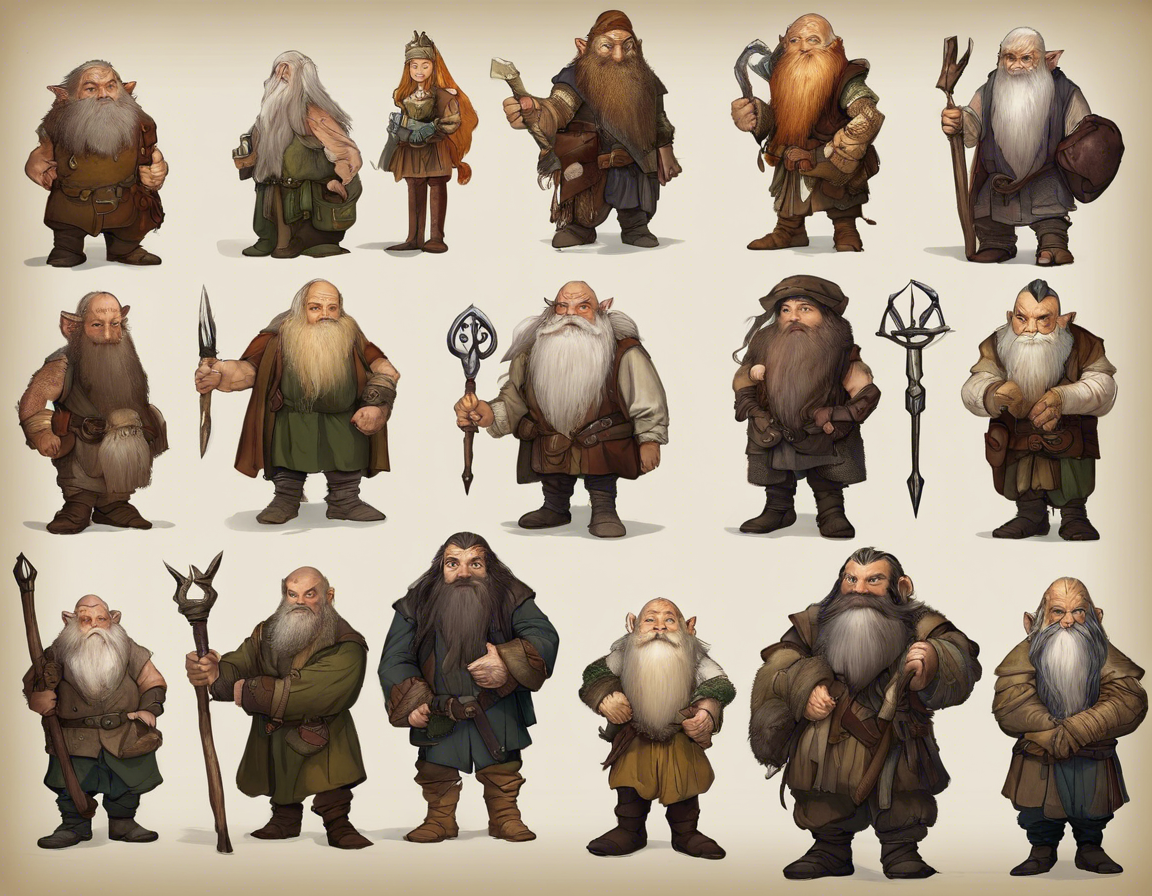Introduction:
The realm of fantasy literature is a rich tapestry interwoven with diverse cultures, captivating creatures, and intriguing characters. Among these fantastical beings, dwarves stand out as iconic figures with their strong personalities, impressive craftsmanship, and unforgettable names. In the realms of J.R.R. Tolkien’s Middle-earth and beyond, dwarven names hold a special allure, reflecting the history, culture, and values of these legendary beings. Let us delve deeper into the mystique of dwarven names, exploring their origins, meanings, and significance in the world of fantasy.
The Origins of Dwarven Names:
Dwarven names are steeped in tradition and lore, reflecting the rich history and craftsmanship of these stout-hearted beings. In J.R.R. Tolkien’s works, specifically “The Hobbit” and “The Lord of the Rings,” dwarven names draw inspiration from Old Norse, Old English, and Old Germanic languages, infusing them with a sense of rugged realism and ancient heritage. From the proud Durin, the mighty Thorin Oakenshield, to the loyal Gimli, each name carries a weight of meaning and history, resonating with the reader long after the story has ended.
The Structure of Dwarven Names:
Dwarven names often consist of two parts: a prefix or title followed by a personal name. The prefix usually denotes the dwarf’s lineage, clan, or affiliation, while the personal name reflects their individual identity and characteristics. For example, Thorin Oakenshield’s name signifies both his royal lineage (Thorin) and his valorous deed of wielding an oaken shield in battle. This dual structure adds depth and complexity to dwarven names, hinting at a rich tapestry of family ties, heroic deeds, and ancestral pride.
The Significance of Dwarven Names:
In the world of fantasy literature, names hold great power and significance, shaping the identity and destiny of the characters. For dwarves, their names are not just labels but reflections of their innate qualities, aspirations, and legacy. A name like Balin the Brave evokes images of courage and honor, while Fili and Kili sound youthful and energetic, befitting their adventurous spirits. By choosing the right name, authors can imbue their dwarven characters with depth, meaning, and a sense of cultural authenticity.
Unraveling the Meanings of Dwarven Names:
Many dwarven names in fantasy literature carry hidden meanings or symbolic significance, adding layers of depth to the characters. For example, the name Gimli means “fire,” reflecting the dwarf’s fiery temper and passionate nature. Thorin, derived from Thor, the Norse god of thunder, hints at the dwarf’s regal bearing and leadership qualities. By unraveling these hidden meanings, readers can gain a deeper understanding of the characters and their motivations, fostering a greater connection to the story.
Crafting Your Own Dwarven Name:
If you are a fan of fantasy literature or role-playing games and wish to immerse yourself in the world of dwarves, why not try crafting your own dwarven name? You can combine elements from Old Norse, Old English, or other ancient languages to create a name that resonates with your personality and interests. Whether you aspire to be a mighty warrior like Dwalin or a skilled craftsman like Bifur, the possibilities are endless. Dive into the world of dwarven names and unleash your imagination in creating a name that embodies your true self.
Cultural Influences on Dwarven Naming Conventions:
The cultural influences on dwarven naming conventions are vast and varied, drawing inspiration from real-world languages, myths, and historical traditions. In addition to Norse and Germanic influences, dwarven names in fantasy literature may also incorporate elements from Celtic, Slavic, or even African languages, adding diversity and depth to the fictional world. By weaving together these diverse threads of inspiration, authors can create a rich tapestry of names that resonate with readers from all walks of life, transcending cultural boundaries and fostering a sense of belonging in the fantastical realms they inhabit.
FAQs about Dwarven Names:
- Is there a specific naming convention for dwarven names in fantasy literature?
-
While there is no strict rule, dwarven names often follow a pattern of prefix + personal name, reflecting lineage or clan affiliation.
-
Do dwarven names have meanings like real-world names?
-
Yes, many dwarven names carry symbolic meanings or reflect the character’s qualities, heritage, or aspirations.
-
Can I create my own dwarven name using online generators?
-
Online generators can be a fun tool to generate dwarven names, but you can also craft your own using elements from ancient languages.
-
Are there variations in dwarven naming conventions across different fantasy worlds?
-
Yes, each author or world-builder may have their own unique naming conventions for dwarven characters, drawing from a variety of cultural influences.
-
Do female dwarves have distinct naming conventions from male dwarves?
- In some fantasy worlds, female dwarves may have names that reflect their unique roles or qualities, but the naming conventions can vary.
Conclusion:
Dwarven names are not mere words on a page but keys that unlock the door to a rich and vibrant world of fantasy, where honor, courage, and kinship reign supreme. By exploring the origins, meanings, and significance of dwarven names, we gain a deeper appreciation for these iconic characters and the worlds they inhabit. Whether you are a seasoned fan of fantasy literature or a newcomer to the genre, the allure of dwarven names is undeniable, drawing us into a realm of magic, adventure, and timeless legends. So, the next time you delve into a book or embark on a quest in a game, remember the power and mystique of dwarven names, waiting to be discovered and cherished for all time.
